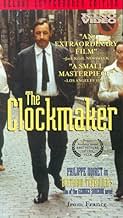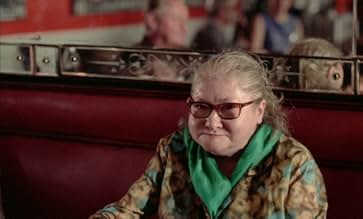IMDb-BEWERTUNG
7,1/10
3043
IHRE BEWERTUNG
Ein Uhrmacher erfährt eines Tages, dass sein Sohn ein Mörder geworden ist. Er versucht zu verstehen, für wen und warum.Ein Uhrmacher erfährt eines Tages, dass sein Sohn ein Mörder geworden ist. Er versucht zu verstehen, für wen und warum.Ein Uhrmacher erfährt eines Tages, dass sein Sohn ein Mörder geworden ist. Er versucht zu verstehen, für wen und warum.
- Auszeichnungen
- 4 Gewinne & 1 Nominierung insgesamt
Empfohlene Bewertungen
I'm a big fan of director Bertrand Tavernier. For me, he's the best French director of the past 30 years. This is one of his early works of the seventies and it had all the elements that makes the great personality of his films. Above all : a great sense of reality. Sometimes, his movies looks like they were improvised, but, in fact, it can't really be. This one is like an emotional crescendo. In the begening, we didn't really know what's going on and what kind of man Philippe Noiret is playing. In the middle, we had a great idea, but we don't know that the last minutes will be so full of intense emotions. The great Noiret and Tavernier will make several other movies together. This is one is among the best.
The Clockmaker is a technically well-crafted precision endeavor in direction, writing, and acting. Director Bertrand Tavernier fashions a subtle, conservative character study asserted into the framework of a crime story, a study of an aging, middle-class clockmaker with a downcast disposition, played, or rather inhabited, by Philippe Noiret. This commonplace man is stunned out of his sluggishness when he finds out that his only son has been arrested for murder.
What is poignant about this story, and what improves the usually dormant drama of a crime film, is that Noiret lives quietly, alone with his son, who is almost grown up. In other words, his son is his whole tranquil life. Yet, when a detective played by mulishly tenacious Jean Rochefort asks him for help with the case, Noiret grasps how little he knows about his son, and struggles with his feeling that he is unable to blame him.
The film opens on Noiret having a night out, when his friends crack wise on the elections, the leftists, a protest rally, and the death penalty. He has fun this night. The next day two policemen come to his shop and rummage around his adjoining apartment. They particularly search his son's room before taking him to the police station where Rochefort tells him his son is wanted for murder of a security guard at the place where his girlfriend was fired, and has not been apprehended. There was even an eyewitness.
Tavernier puts Noiret's character through a motley crew of odd dramatic angles aside from just the press, who are of course just interested in ratings, but also tangents to the main thread of the film like right-wing hooligans who vandalize his window and two girls who confirm how vile the murdered guard was to women. The skillful essence of the film is in the abstractness of it, giving us impressions of how much his relationship with his son means to him, and how bewildered he is that he has no idea what to do to help his son, such as in his transit back home from the precinct and can't stand without feeling ill and has to ask a passenger for his seat.
The film is not hard-hitting enough to be great, but it serves its locale with an authentic atmosphere. The story itself, no matter how well it poignantly portrays a world in miniature, is nevertheless very slight. On the whole, The Clockmaker is a dramatic exercise. As many other French films from the 1960s and '70s were, it is less about telling the story and more about technique. It doesn't compare to the boisterousness and self-consciousness of most of the New Wave films of that time, and in fact is a particularly subtle film. It is essentially a film that says of film-making, "Yes, less is more."
What is poignant about this story, and what improves the usually dormant drama of a crime film, is that Noiret lives quietly, alone with his son, who is almost grown up. In other words, his son is his whole tranquil life. Yet, when a detective played by mulishly tenacious Jean Rochefort asks him for help with the case, Noiret grasps how little he knows about his son, and struggles with his feeling that he is unable to blame him.
The film opens on Noiret having a night out, when his friends crack wise on the elections, the leftists, a protest rally, and the death penalty. He has fun this night. The next day two policemen come to his shop and rummage around his adjoining apartment. They particularly search his son's room before taking him to the police station where Rochefort tells him his son is wanted for murder of a security guard at the place where his girlfriend was fired, and has not been apprehended. There was even an eyewitness.
Tavernier puts Noiret's character through a motley crew of odd dramatic angles aside from just the press, who are of course just interested in ratings, but also tangents to the main thread of the film like right-wing hooligans who vandalize his window and two girls who confirm how vile the murdered guard was to women. The skillful essence of the film is in the abstractness of it, giving us impressions of how much his relationship with his son means to him, and how bewildered he is that he has no idea what to do to help his son, such as in his transit back home from the precinct and can't stand without feeling ill and has to ask a passenger for his seat.
The film is not hard-hitting enough to be great, but it serves its locale with an authentic atmosphere. The story itself, no matter how well it poignantly portrays a world in miniature, is nevertheless very slight. On the whole, The Clockmaker is a dramatic exercise. As many other French films from the 1960s and '70s were, it is less about telling the story and more about technique. It doesn't compare to the boisterousness and self-consciousness of most of the New Wave films of that time, and in fact is a particularly subtle film. It is essentially a film that says of film-making, "Yes, less is more."
The star of this film is the city of Lyons, which looks absolutely magnificent. The problem with the film is that it rambles along until the son is finally captured and tried, and is reconciled with his father. The father doesn't seem to know what's going on at the start or how he feels about his son, before eventually deciding that he wants him to escape. But the film just seems to drift from one encounter to another, with the policeman, with his friend, with the press, with his son's girlfriend's workmates, with the woman who helped bring his son up. Perhaps the director is trying to show what it's like to be waiting for news in such a situation and the sense of not being able to do anything about it. Philippe Noiret and Jean Rochefort are both excellent in portraying sympathetic characters. The son and girlfriend are also portrayed as sympathetic - although we are never explicitly told why they committed the murder, their victim is shown to have been a nasty piece of work. The almost documentary style is in contrast to the cinematic style of other Simenon adaptations such as "Monsieur Hire" and "The Hatter's Ghost". No intrusive music as in "Monsieur Hire" for example.
This film is a brilliant portrayal of a man caught between his private memories of a fugitive son and the political interpretations of his son's actions. There is a constant interplay between Michel Descombes's private existence, individualized profession (as an artisan, he is necessarily the opposite of a mass producer), and the public spectacle that his son has become. It is truly a fascinating commentary on subversion and freedom, wonderfully played by Noiret and other greats, that provides incredible emotional depth.
In spite of watching that movie for the sake of great director Bertrand Tavernier, I came across a purely eccentric and impressive masterpiece. Philipe Noiret ,my favorite actor in il Postino and Cinemo Paradiso, performs his boundary limits. Bertrand Tavernier's left glass a little ruins films from the political concern. However this does not reduce the total film quality. Tavernier's camera focuses on an ordinary widow clockmaker surrounding with the high tension political turmoil in Lyon early 1970s. Noiret's son is accused of a factory boss murder and runaway. Between police and his son, Noiret tries to find the real reason that led the murder. But this is a neither action nor criminal movie. Pure relationship between father and son is the core theme of the film. All things considered I strongly recommend this impressive and emotional movie for people to have some idea about the political atmosphere of early 1970s.
Wusstest du schon
- WissenswertesThe house where Michel meets the old lady who took care of his son is the house where Bertrand Tavernier lived his childhood with his parents during WWII. René Tavernier was a friend of Louis Aragon and Elsa Triolet.
- PatzerAt 33:08' a waiter enters the police station with a tray with four beers. Camera cuts to the adjacent office and when it returns, there are only two beer bottles left.
- Crazy Creditsto Jacques Prevert
- VerbindungenEdited into Le documentaire culturel: Le siècle de Simenon (2014)
Top-Auswahl
Melde dich zum Bewerten an und greife auf die Watchlist für personalisierte Empfehlungen zu.
- How long is The Clockmaker?Powered by Alexa
Details
- Laufzeit1 Stunde 45 Minuten
- Sound-Mix
- Seitenverhältnis
- 1.66 : 1
Zu dieser Seite beitragen
Bearbeitung vorschlagen oder fehlenden Inhalt hinzufügen

![Bande-annonce [OV] ansehen](https://m.media-amazon.com/images/M/MV5BZTA2YTQxYjYtNTE3NS00NTg0LWFiMjItMzgyMmZjYzdhMTJlXkEyXkFqcGdeQXRyYW5zY29kZS13b3JrZmxvdw@@._V1_QL75_UY281_CR6)




























